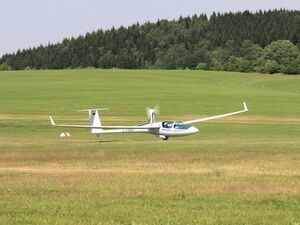Engineering:Schleicher ASG 32
| ASG 32 | |
|---|---|

| |
| An ASG 32 Mi taking off under own power | |
| Role | Two Seater Class sailplane |
| National origin | Germany |
| Manufacturer | Schleicher |
| Designer | Michael Greiner |
| First flight | 31 May 2014[1] |
The ASG 32 is a Two Seater Class glider manufactured by Alexander Schleicher. The prototype had its maiden flight in Poppenhausen on 31 May 2014.[1] Deliveries began in 2015.
Design and development
The ASG 32 is a two-seat mid-wing sailplane of composite construction, it has a retractable landing wheel and a horizontal tail mounted atop the vertical fin (T-tail).
The aircraft was announced in April 2013, with the intention that it would fill the gap between the ASK 21 trainer and the larger Schleicher ASH 30 Open Class two seater. The ASG 32 meets the requirements of the FAI 20 metre Two-Seater Class. Pure sailplane, motorized self-launching and sustainer engine versions were announced.[2]
Construction of the prototype started in 2013, during which the fuselage and tailplane were displayed.[3] The maiden flight was on 31 May 2014, piloted by the designer Michael Greiner and the Schleicher CEO, Peter Kremer.[1]
The electrically powered variant of the ASG 32 will be delivered after the other variants.[4]
The ASG 32 and ASG 32 Mi were awarded an EASA Type Certificate on 11 February 2016.[5]
Variants
Data from Schleicher [6]
- ASG 32
- The pure sailplane, without any engine.
- ASG 32 Mi
- The motor glider aircraft, capable of self launching with a retractable engine and propeller mounted in the centre fuselage.
- ASG 32 El
- The electrically propelled motor glider aircraft, capable of sustaining flight for an expected 100 km (62 mi) under engine power.[4]
Specifications (ASG 32 Mi)
General characteristics
- Crew: Two
- Length: 9.07 m (29 ft 9 in) (fuselage)
- Wingspan: 20 m (65 ft 7 in)
- Height: 1.84 m (6 ft 0 in)
- Wing area: 15.7 m2 (169 sq ft)
- Empty weight: 545 kg (1,202 lb) (approx.)
- Max takeoff weight: 850 kg (1,874 lb)
- Pilot Capacity: One or two people, up to 120 kg (265 lb) each
- Powerplant: 1 × Austro Engine IAE 50R-AA single rotor Wankel engine, 41 kW (55 hp)
- Propellers: 2-bladed Schleicher AS2F1-1/R153-92-N1, 1.53 m (5 ft 0 in) diameter (retractable)
Performance
- Maximum speed: 180 km/h (110 mph, 97 kn) with propeller extended
- Never exceed speed: 270 km/h (170 mph, 150 kn)
- Maximum glide ratio: 52
- Wing loading: 54.1 kg/m2 (11.1 lb/sq ft) (max.)
- Min. wing loading: 33.8 kg/m2 (6.9 lb/sq ft) with one 70 kg (155 lb) pilot
See also
Related lists
References
Notes
Citations
- Eckey, Bernard (April 2014). "Interview with Ulrich Kremer". Gliding Australia (Sydney, Australia: Gliding Federation of Australia) (17): 43–44. http://www.gfa.org.au/mag/GA17/GA17.html. Retrieved 5 August 2014.
- Elliott, Bill (22 April 2013). "Schleicher Announces the ASG 32 (Update with Photos)". SoaringCafe.com. http://soaringcafe.com/2013/04/schleicher-announces-the-asg-32-a-new-20m-two-seater/#2.
- "ASG 32 – Production of wing prototype started". Alexander Schleicher GmbH & Co. Segelflugzeugbau. February 2014. http://www.alexander-schleicher.de/Neuigkeiten/aktuell_127_e.htm.
- "Brochure ASG 32 / ASG 32 Mi / ASG 32 El". Alexander Schleicher GmbH & Co. Segelflugzeugbau. 22 January 2014. http://www.alexander-schleicher.de/service/prospekte/AS%20Einzelprosp%2032%20de%2013%2004.pdf.
- "Maiden flight: ASG 32 Mi enthuses the pilots". Alexander Schleicher GmbH & Co. Segelflugzeugbau. May 2014. http://alexander-schleicher.de/Neuigkeiten/aktuell_130_e.htm.
External links
- Schleicher website
- "AE50R Technical Data Sheet". Austro Engine GmbH. 15 September 2010. http://austroengine.at/uploads/pdf/mod_products2/2010092010AE50R_Technical_Data_Sheet.pdf.
 |

